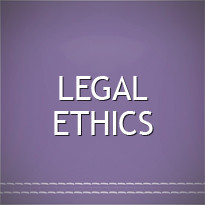A.C. No. 6672 – 614 Phil. 327 – 598 SCRA 133 – Legal Ethics – Unethical Solicitation of Legal Business
In 2005, Atty. Pedro Linsangan filed an administrative complaint against Atty. Nicomedes Tolentino alleging that Atty. Tolentino, through his paralegal Fe Marie Labiano, “pirated” a client of Atty. Linsangan. Said client later executed an affidavit in support of Atty. Linsangan’s allegations.
Atty. Linsangan also questioned the propriety of Labiano’s calling card which appears as follows:
FRONT
|
NICOMEDES TOLENTINO CONSULTANCY & MARITIME SERVICES Fe Marie L. Labiano |
BACK
|
SERVICES OFFERED: CONSULTATION AND ASSISTANCE |
In his defense, Atty. Tolentino denied knowing Labiano. He also denied authorizing the printing of such calling cards.
ISSUES:
1. Whether or not Atty. Nicomedes Tolentino encroached upon the professional services of Atty. Pedro Linsangan.
2. Whether or not Atty. Tolentino is liable for the improper calling card of Labiano.
HELD:
1. Yes. Atty. Tolentino violated Rule 8.02 of the Code of Professional Responsibility. A lawyer should not steal another lawyer’s client nor induce the latter to retain him by a promise of better service, good result or reduced fees for his services. By recruiting Atty. Linsangan’s clients, Atty. Tolentino committed an unethical, predatory overstep into another’s legal practice.
2. Yes. Atty. Tolentino violated Rules 1.03, 2.03, and 16.04 of the Code of Professional Responsibility. Although Atty. Tolentino initially denied knowing Labiano, he admitted he actually knew her later in the proceedings. It is thus clear that Labiano was connected to his law office. Through Labiano’s actions, Atty. Tolentino’s law practice was benefited. Hapless seamen were enticed to transfer representation on the strength of Labiano’s word that Atty. Tolentino could produce a more favorable result.
Labiano’s calling card is improper. The card made it appear that the law office will finance legal actions for the clients. The rule is, a lawyer shall not lend money to a client except, when in the interest of justice, he has to advance necessary expenses in a legal matter he is handling for the client.
The rule is intended to safeguard the lawyer’s independence of mind so that the free exercise of his judgment may not be adversely affected. It seeks to ensure his undivided attention to the case he is handling as well as his entire devotion and fidelity to the client’s cause. If the lawyer lends money to the client in connection with the client’s case, the lawyer in effect acquires an interest in the subject matter of the case or an additional stake in its outcome. Either of these circumstances may lead the lawyer to consider his own recovery rather than that of his client, or to accept a settlement which may take care of his interest in the verdict to the prejudice of the client in violation of his duty of undivided fidelity to the client’s cause.
The phrase in the calling card which states “w/ financial assistance“, was clearly used to entice clients (who already had representation) to change counsels with a promise of loans to finance their legal actions.
However, since there is no substantial evidence to prove that Atty. Tolentino had a personal and direct hand in the printing of said calling cards, he cannot be punished with severity. At any rate, for all the infractions Atty. Tolentino committed, he was suspended by the Supreme Court for one year.


